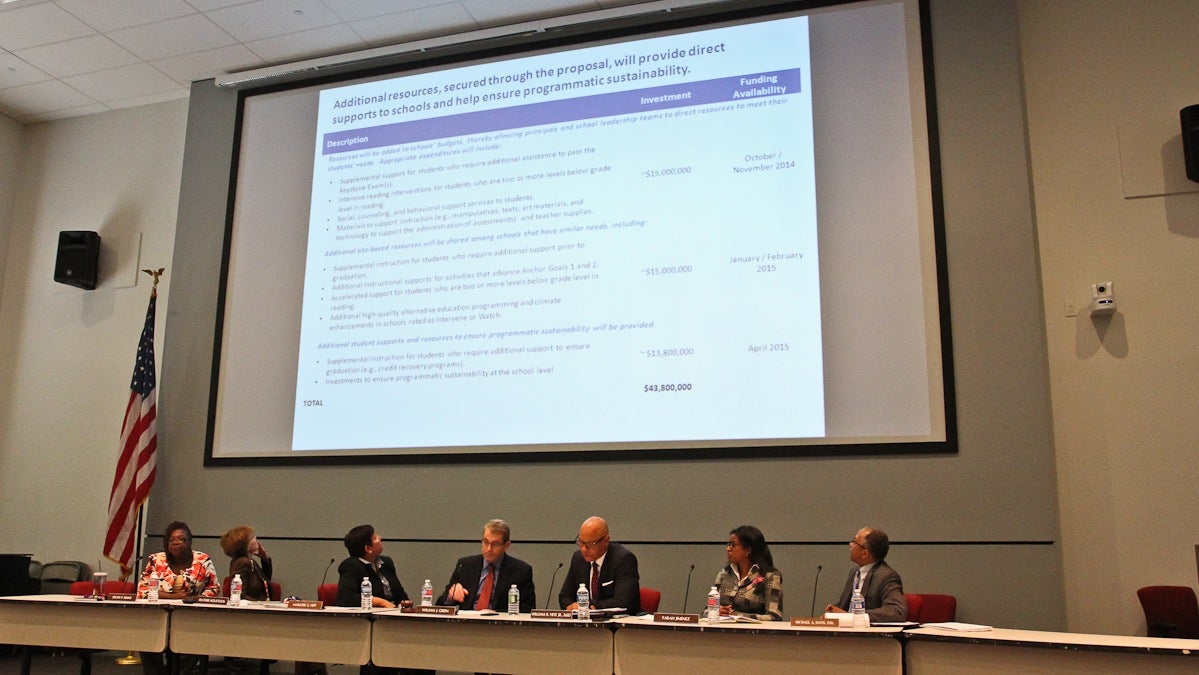District appeals to Pa. Supreme Court on teachers contract decision
Listen
The SRC voted to unilaterally restructure teacher health benefits on October 6, 2014. The teachers' union challenged the decision in the Pa. Commonwealth Court, and won in January. (Kimberly Paynter/WHYY, file)
The School Reform Commission is asking the state Supreme Court to reverse a lower court decision that the SRC lacks the authority to cancel its contract with the Philadelphia Federation of Teachers and spend the savings on programs in the schools.
The District and SRC waited until the last possible day to file the appeal of the Commonwealth Court’s Jan. 22 decision.
“We remain convinced that the SRC had clear statutory authority when it acted last fall to redirect a projected $200 million in savings to our schools over the next four years,” said a statement from the SRC and the District. “The SRC was exercising the precise function for which it was created: achieving financial stability for the District in a crisis of underfunding that has prevented our schools from providing basic resources and services to students.”
Expecting the appeal, PFT president Jerry Jordan issued a statement saying that the District should return to the bargaining table and not spend any more money on litigation. “It’s truly a shame that the SRC views contract negotiations as an obstacle rather than an opportunity to work together on real solutions to the challenges facing our schools.”
Jordan said in an interview that he remained ready to return to the bargaining table, but that there have been no further negotiatons since the District announced its action.
In its 5-0 ruling, Commonwealth Court said it was “cognizant of the dire financial situation which the District currently faces and the SRC’s extensive efforts to achieve the overall goal of properly and adequately meeting the educational needs of the students.”
It added, however, that “despite these earnest efforts by the SRC, we cannot find that the legislature has provided the means expressly required” to cancel the collective bargaining agreement.
The SRC statement called the decision “wrongly decided” and said it believes Commonwealth Court “misinterpreted and misapplied the law.” It also termed nearly 20 months of negotiations with the PFT as “fruitless.” The union’s last contract expired more than two years ago.
“[D]espite four years of budget shortfalls that have cost the District one-third of its workforce and the closure of 31 schools, the needed economies sought by the SRC are largely limited to bringing the healthcare package for the Philadelphia Federation of Teachers’ union in line with what other District, city, and state employees receive,” the SRC statement said. “That change is unfortunate but, given the decimation of District schools, fruitless contract negotiations, and the fact that most unionized and non-unionized employees in Philadelphia and across the country now pay into their health plans, it is reasonable.”
At a barely publicized meeting on Oct. 6, the SRC voted to cancel the PFT contract, unilaterally requiring members to pay into their health benefits and announcing that it would immediately redirect $44 million into school programs. The benefit changes, scheduled to begin in December, are on hold given the court action, but the District has sent some additional money to schools anyway.
The law that established the SRC gave it special powers to put the School District on sound financial footing, but those powers are being challenged on several fronts, including whether it can limit growth of charter schools.
In this case, part of the dispute is over what the legislation means when it refers to contracts. It says that the SRC has the power to “cancel or renegotiate any contract other than teachers’ contracts.” In the brief, the District and SRC maintained that this only referred to teacher contracts in force at the time the legislation was passed, not to any subsequent contracts that were negotiated by the SRC.
Linda Kaboolian is an expert in public sector unions, an instructor at the Harvard Kennedy School of Government, and a consultant on collective bargaining. She said that the legislation is not clear but does not appear to give the SRC the powers it is claiming. But the SRC needs to push the legal issue as far as it can, she said, so it can convince the state legislature that it is out of options.
“People that don’t want to give Philadelphia [schools] money are going to say, ‘Did you shake the union for as much as you could?,'” she said.
—
WHYY’s Laura Benshoff contributed to this story.
NewsWorks and the Notebook collaborate on reporting projects looking closely at the effectiveness of city schools. NewsWorks republishes the Notebook’s reporting for a wider audience.
WHYY is your source for fact-based, in-depth journalism and information. As a nonprofit organization, we rely on financial support from readers like you. Please give today.




